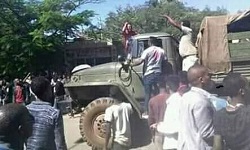In its statement the Ethiopian Human Rights Commission (EHRC) indicated that it has been monitoring closely and is in consultation with the relevant authorities regarding the risk of multidimensional human rights violations arising from the ongoing war in Tigray Region.
While it is important to maintain efforts towards a peaceful resolution even at the current stage of the conflict; as long as the situation of war or armed conflict prevails, EHRC conveys the following recommendations pertaining to the safety and security of civilians not taking part in the conflict and the overall risk of human rights abuses ensuing from the conflict.
Humanitarian Assistance and Access
In situations of war or armed conflict, such as the one currently ongoing in Tigray Region, humanitarian assistance and access to basic services must be ensured in particular to protect the human rights and security of civilians not taking part in the conflict. The following are the main reasons why it is necessary to do so:
To deliver food, medicine and similar necessities to civilians,
To avail medical care for those wounded or sick during the conflict,
To rehabilitate victims and affected areas,
To return and rehabilitate displaced persons and
To provide the appropriate humanitarian assistance to the large number of refugees in the area.
In light of this, to facilitate the swift delivery of humanitarian assistance and services,EHRC calls for the immediate creation of an Humanitarian Assistance Desk at the level of the Ethiopian Defense Force and/or at the Federal Government level; specifically at the level of the Emergency Task Force established to oversee the state of emergency in Tigray Region, and the start of discussions with humanitarian organizations. EHRC will follow up on the implementation thereof with relevant authorities.
In addition, it urges all parties to the conflict to respect the emblems/insignia of the Red Cross and Red Crescent,in accordance with applicable international laws, and to give the support necessary to allow the Red Cross/Red Crescent Society to provide humanitarian services/to carry out its humanitarian functions.
Investigating human rights violations occurring during conflict
As EHRC stated on previous occasions, human rights must be respected even during situations of armed conflict/war; and particularly armed persons taking part in the conflict have the responsibility to protect civilians.
EHRC will therefore work towards ensuring accountability by investigating and gathering evidence on human rights abuses committed by any party taking part in the conflict. Regarding the humanitarian crisis in Maykadra, it has dispatched a verification team on location to investigate and gather evidence. It will also investigate any other human rights abuses wherever they might occur; it will strive to ensure that perpetrators are held accountable.
Risk of human rights violations related to the conflict
EHRC is closely monitoring the situation of persons detained as a result of ongoing measures related to the conflict taken by the government in various parts of the country and reports, in certain parts of the country, of people facing discriminatory and exclusionary processes on account of their Tigrayan ethnicity.
Based on information and tips that EHRC has received, we have learned that a justified risk/threat of fear of ethnic profiling and discrimination has arisen, and the Commission is monitoring this closely. We call on all persons to provide the EHRC with information and tips when such human rights violations have occurred or there is a justified risk that they will.
In this regard, EHRC would like to recall that, since the applicability of the recently adopted state of emergency is limited to Tigray Region, the law enforcement measures being taken in other parts of the country should follow the regular legal procedures.
EHRC has carried out a quick monitoring in selected police stations in Addis Ababa and has seen, firsthand, the condition of persons detained in relation with current events. Accordingly, the Commission has visited the cases of a total of 43 persons detained in Bole, Kazanchis, Aware, TekleHaymanot and Cherkos police stations. It has also gathered information on suspected persons released on bail. EHRC has learned that many of these persons were suspected of carrying firearms without a lawful permit, that all of them have been brought before a court within the prescribed time frame and that most of them have been granted bail.
One of the detained persons that EHRC has talked to has reported being beaten by the arresting officer and the police have assured the Commission that this will be investigated; we will follow up. The rest of the detained persons have reported that they have not been mistreated in any way during the investigation, that they have not faced threats or abuse and that the condition of their detention is fine. However, some of the detained have reported that they have been arrested only because of their ethnicity; and one of them has complained to the Commission that he was forced to hand over his weapon and take annual leave from his work.
Police, on its part, maintains that the searches were carried out based on court orders quickly issued by telephone, in accordance with the law, to get an early hold on weapons that can be concealed easily; that the overall operation has followed the applicable legal procedures and that most of the suspected have been released on bail.
EHRC has noted that that there have not been human rights violations other than the one case mentioned above whose condition and process of detention is yet to be investigated. Meanwhile, EHRC recommends that due care must be taken to reduce the risk or fear of ethnic profiling and discrimination.
